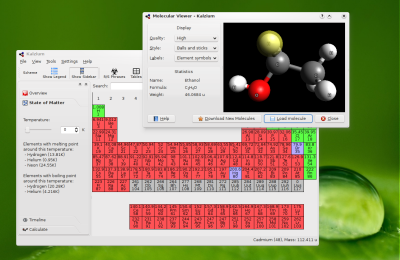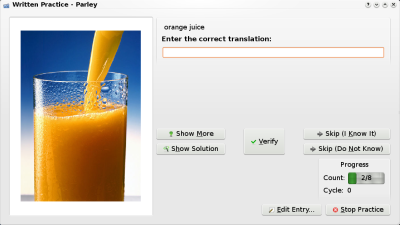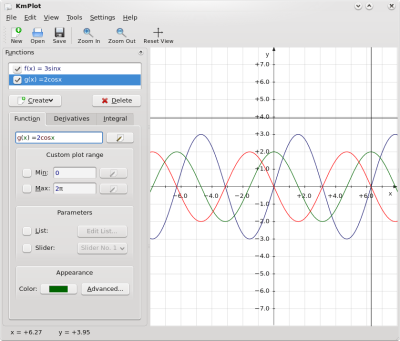KDE 4.0.3 Release Announcement
Wednesday, 2 April 2008
FOR IMMEDIATE RELEASE
KDE Project Ships Third Translation and Service Release for Leading Free Software Desktop
KDE Community Ships Third Translation and Service Release of the 4.0 Free Desktop, Containing Numerous Bugfixes, Performance Improvements and Translation Updates
The KDE Community today announced the immediate availability of KDE 4.0.3, the third bugfix and maintenance release for the latest generation of the most advanced and powerful free desktop. KDE 4.0.3 is the third monthly update to KDE 4.0. It ships with a basic desktop and many other packages; like administration programs, network tools, educational applications, utilities, multimedia software, games, artwork, web development tools and more. KDE's award-winning tools and applications are available in 49 languages.
KDE, including all its libraries and its applications, is available for free under Open Source licenses. KDE can be obtained in source and various binary formats from download.kde.org and can also be obtained on CD-ROM or with any of the major GNU/Linux and UNIX systems shipping today.
Enhancements
KDE 4.0.3 comes with an impressive amount of bugfixes and improvements. Most of them are
recorded in the
changelog.
KDE continues to release updates for the 4.0 desktop on a monthly basis. KDE 4.1, which will
bring large
improvements to the KDE desktop and application will be released in July this year.
KDE 4.0.3 improvements revolve around lots of bugfixes and translation updates.
Corrections have been made in such a way that results in only a minimal risk of
regressions. For KDE, it is also a way to deliver bugfixes quickly to the users.
An excerpt from the changelog reveals that nearly all modules in KDE have seen lots of improvements. Again, the KHTML team has done an awesome job in improving the user experience with the Konqueror web browser.
- Scrolling optimisations in KHTML, KDE's HTML rendering engine
- Improved handling of dialog windows in KWin, KDE's window manager
- Various rendering improvements in Okular, KDE's document viewer
Extragear
Since KDE 4.0.0, Extragear applications are also part of regular KDE releases. Extragear applications are KDE applications that are mature, but not part of one of the other KDE packages. The extragear package that is shipped with KDE 4.0.3 ship the following programs:
- KColoredit - An editor for color palette files that supports KDE and Gimp color palette formats
- KFax - A desktop fax viewer
- KGrab - A more advanced screenshot taking tool
- KGraphviewer - A GraphViz dot graph viewer for KDE
- KIconedit - A drawing program for icon graphics
- KMldonkey - A graphical client for the EDonkey network
- KPovmodeler - A 3D modeler
- Libksane - An image-scanning library
- RSIbreak - A program that saves you from getting RSI by enforcing breaks
New in this release of the Extragear application is the Gopher KIO slave, a plugin that adds support for the Gopher protocol to all KDE applications.
KDE's Educational Application Suite
KDE 4.0.3 ships with a suite of high-quality educational software. The applications range from Marble, the versatile desktop globe, to a fun small game for younger kids.
Kalzium is a graphical periodic table of elements. It visualizes abstract concepts such as atoms attractively. Kalzium also brings numerous ways to display detailed information about elements. Kalzium has been built as a tool which makes chemistry easily understandable for high-school kids - but it is also a lot of fun to play with for grown-ups.
Parley is a program to help you memorize vocabulary. Parley supports many language-specific features but can be used for other learning tasks just as well. It uses the spaced repetition learning method, also known as flash cards. Creating new vocabulary collections with Parley is easy, but of course it is even better if you can use some of our premade files that can be downloaded from the Internet.
Kmplot is a mathematical function plotter, providing an easy tool for a better understanding of maths. You can easily input mathemetical functions with it and see the graphs those functions describe.
Those that want more information about KDE's educational applications should take the KDE Education Project Tour.
Installing KDE 4.0.3 Binary Packages
Packagers. Some Linux/UNIX OS vendors have kindly provided binary packages of KDE 4.0.3 for some versions of their distribution, and in other cases community volunteers have done so. Some of these binary packages are available for free download from KDE's download.kde.org. Additional binary packages, as well as updates to the packages now available, may become available over the coming weeks.
Package Locations. For a current list of available binary packages of which the KDE Project has been informed, please visit the KDE 4.0.3 Info Page.
Compiling KDE 4.0.3
Source Code. The complete source code for KDE 4.0.3 may be freely downloaded. Instructions on compiling and installing KDE 4.0.3 are available from the KDE 4.0.3 Info Page.
Supporting KDE
KDE is a Free Software project that exists and grows only because of the help of many volunteers that donate their time and effort. KDE is always looking for new volunteers and contributions, whether it is help with coding, bug fixing or reporting, writing documentation, translations, promotion, money, etc. All contributions are gratefully appreciated and eagerly accepted. Please read through the Supporting KDE page for further information.
We look forward to hearing from you soon!
About KDE 4
KDE 4.0 is the innovative Free Software desktop containing lots of applications
for every day use as well as for specific purposes. Plasma is a new desktop
shell developed for
KDE 4, providing an intuitive interface to interact with the desktop and
applications. The Konqueror web browser integrates the web with the desktop. The
Dolphin file manager, the Okular document reader and the System Settings control
center complete the basic desktop set.
KDE is built on the KDE Libraries which provide easy access to resources on the
network by means of KIO and advanced visual capabilities through Qt4. Phonon and
Solid, which are also part of the KDE Libraries add a multimedia framework and
better hardware integration to all KDE applications.
About KDE
KDE is an international technology team that creates free and open source software for desktop and portable computing. Among KDE’s products are a modern desktop system for Linux and UNIX platforms, comprehensive office productivity and groupware suites and hundreds of software titles in many categories including Internet and web applications, multimedia, entertainment, educational, graphics and software development. KDE software is translated into more than 60 languages and is built with ease of use and modern accessibility principles in mind. KDE’s full-featured applications run natively on Linux, BSD, Windows, Haiku, and macOS.
Trademark Notices.
KDE® and the K Desktop Environment® logo are registered trademarks of KDE e.V..
Linux is a registered trademark of Linus Torvalds. UNIX is a registered trademark of The Open Group in the United States and other countries.
All other trademarks and copyrights referred to in this announcement are the property of their respective owners.
Press Contacts
For more information send us an email: press@kde.org


